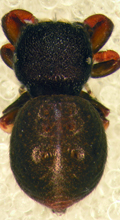Latest News Archive
Please select Category, Year, and then Month to display items
09 March 2022
|
Story Dr Cornelius Hagenmeier
 Internationalisation professionals attending the Dialogue on Innovative Higher Education Strategies National Multiplication Training workshop at the UFS.
Internationalisation professionals attending the Dialogue on Innovative Higher Education Strategies National Multiplication Training workshop at the UFS.
Dr Segun Obadire (Univen) and
Dr Cornelius Hagenmeier (UFS), who serve as directors responsible for the international offices at their universities, are part of the training committee. The theme of the training programme is ‘Enabling Internationalisation in Light of the 2020 Policy Framework for Internationalisation of Higher Education in South Africa 2022’; it comprises two training workshops and several virtual engagements. The first training workshop was held at the UFS from 1 to 3 March 2022.
Trendsetters
Mrs Nontlanhla Ntakana and Mr Matome Mokoena are alumni of the biannual DAAD DIES Training Course on Management of Internationalisation (MOI) at the
Leibniz University Hannover in Germany. They seized the opportunity to forge a multiplication training that would impact internationalisation leaders and managers from across South Africa and empower them to leverage the 2020 Policy Framework for Internationalisation of Higher Education in South Africa to advance the internationalisation process at their institutions.
Internationalisation experts
Dr Nico Jooste and Mrs Merle Hodges served as external experts on the training committee. Both are internationally renowned experts in the field and former presidents of the
International Education Association of South Africa (IEASA). Mr Leolyn Jackson (Central University of Technology, CUT) and Prof Lynette Jacobs (UFS) also contributed to the first training workshop.
Structure
This programme commenced in February, with participants engaging in topical readings and submitting their first assignment. First, a virtual workshop introduced participants to the UNIVEN Moodle e-learning platform used for the course. The face-to-face workshop at the UFS will be followed by a second in-person training at the University of Venda in September 2022. Virtual workshops and support of the participants through a dedicated WhatsApp group and other mentorship programmes will ensure the continuity of the training between the face-to-face workshops. Participants who were unable to attend the UFS and UNIVEN workshops in person could participate via a virtual link, thus ensuring that no participant is left behind.
Participants
Twenty participants from eight public higher education institutions were selected by the training committee to participate in the training programme. Two participants from this year’s NMT cohort were also accepted into the DIES MOI course at the Leibniz University Hannover in Germany. They are
Prof Nontokozo Mashiya from the University of Zululand (Unizulu) and Mbali Mkhize from the
Mangosuthu University of Technology (MUT). Participants in the first workshop have indicated that they gained a lot from the numerous exercises and activities in the programme. They also mentioned that the programme would change the outlook of internationalisation at their universities in the future.
UFS entomologists describe a new spider species
2014-02-19
|
 |
It is about 3mm in size and almost looks like a ladybird, but this new spider is the cause of great excitement at the University of the Free State’s (UFS’s) Department of Zoology and Entomology.
The new species of spider, now known as Rhene amanzi, was recently described for the first time and was ‘introduced’ to other arachnologist at the recent congress of the African Arachnology Society at Amanzi Private Reserve.
Dr Charles Haddad, senior lecturer in the UFS’s Department of Zoology and Entomology, said they already stumbled upon the male spider in 2010 when a student was doing research at the reserve. After a very long process, the spider was described and a couple of weeks ago, whilst at the congress, they also found the female.
“Up to now we only know that the spider lives in trees in the Brandfort area. The range could be wider, but since it was only described recently, other arachnologists will only now be able to identify accurately.”
Dr Haddad says they still have to determine how many eggs the female is able to lay, what the spider’s life cycle looks like and what their habitual preferences are.
“What we do know is that it probably isn’t poisonous and that the spider imitates a ladybird in order to protect itself against predators.”